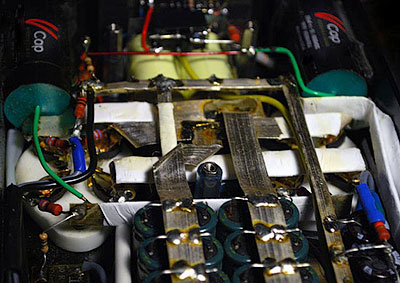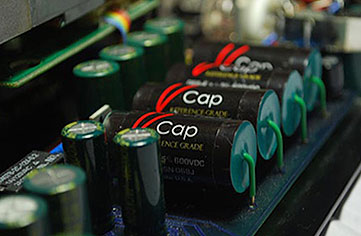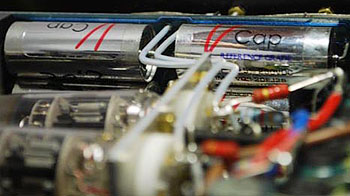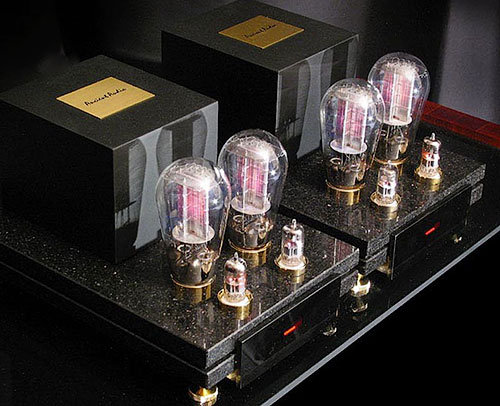|
|
|||||||||
Here is what Jarek Waszczyszyn of Ancient Audio has to say about his experience with V-Caps: "The right design, and having a deep background in solid engineering is the obligatory starting point for any serious electronic project. However with high-end audio , that sonic result is dependant on many variables that are sometimes difficult to predict or measure. Tuning audio equipment is like playing the violin - changing subtle elements makes a big influence to the final result. Tuning simple, vacuum tube circuits can show the importance of each component. I have spent hundreds of hours changing wires, tubes, resistors, sockets, capacitors and other components to find a "right sound". Capacitors (both signal and power) are among the most sensitive and critical components (not counting tubes). The best were Teflon capacitors. Teflon has electron polarisation - the fastest, without any memory effect. It was audible within the first few seconds - my first pair of "Silver Grand Mono" amplifiers with Teflon capacitors immediately "opened" the sound, and delivered a lot of details and information about recordings' acoustics, with a smooth presentation. I was sure, that it would be my selection "forever". That is, until I received a small parcel with V-Caps...
Changing very well-known Teflon capacitors to V-Cap TFTF (Fluoropolymer Film Tin foil) very clearly demonstrated how big the potential had been in my amplifier. The sound with V-Caps was changed in opposite directions. From one side - more details and "air". From the other - less noise and sharpness in treble range. From the one side - brilliant drum plates and baroque mandolin strings. From the other - better defined double bass. From one point - excellent dynamics. From the other - more natural vocals. I must admit, most of my products are manufactured as "cost-no-object". The top complete Ancient Audio system exceeds $300,000. However, if I hear any solution that improves the sound, I use it - no matter how much it may cost. I use the most expensive tweeter ever built (Raven), because it is the best I've heard. Also Valvo, Siemens or Telefunken E88CC tubes - they are rare, but they are present on the top of my amplifier. A small laboratory specially makes a silver ribbon for wiring all my products - because it is necessary. Speaker transformers are hand wired by hand-coated silver wire - it requires weeks of handcrafting - but it is essential. I didn't hesitate and selected the V-Cap TFTF for my CD players and tube amplifiers. It is a necessary ingredient of Ancient Audio's sound until... I am impatiently waiting for a parcel with Fluoropolymer / Copper V-Caps. A few words about OIMP V-Caps. My first application was for the power supply of the Silver Grand Mono '2006 Edition. I made the first trial just for fun. Connecting a small foil capacitor in parallel to very big electrolytic cap bank was always only slightly audible. Even a trial with TFTF V-Caps was audible only at the threshold of my hearing. Then I connected the OIMP's. It seems counter-intuitive that a 2 uF OIMP can improve a 2000 uF bank, but it is true. The first impression was bass - more energetic, and better controlled. Also the focus, specifically of back-located instruments was improved. A possible explanation is that the OIMP has more losses than other capacitors above the audio band. So, they dissipate unwanted oscillations of power components (rectifiers, transistors, big capacitors, wires). This improvement of power was tested successfully on other amplifiers. My friend ( hard-core audiophile ) simply loves his McIntosh MC 275 amp. It is an old unit ( c.a . 1962) , which I repair from time to time. I added four OIMPS to the power supply, and the result was similar to my Silver Grand - better bass, more energy, sharp focusing. As result, the love of MC 275 is now rock-solid. OIMP V-Caps can also help to "purify" a signal from digital artifacts. It is a reason to apply both TFTF and OIMP V-caps in my latest CD player - Lektor Air. In the case of cheaper products ($10,000 $ - $14,000) the V-Caps are a significant part of component cost, but everybody simply likes this sound. ". - Jarek Waszczyszyn - Ancient Audio
READ MORE REVIEWS of the V-Cap Capacitors | |||||||||
|
|
|||||||||



